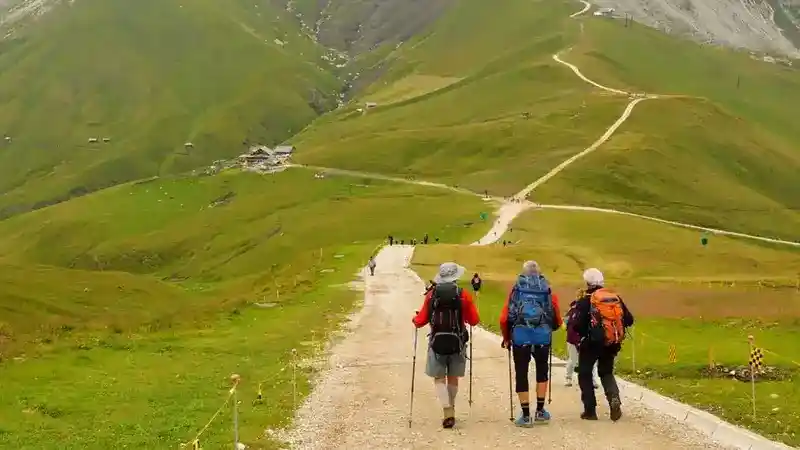There are backpacks for a variety of use, but here I address the question from the title with the focus on packs for outdoor use, and this means hiking, mountaineering, and backpacking.
You have seen the question in the title, and I would pint out that this is not about one thing but several of them. When they are combined, carrying a pack can be unpleasant. When you go outdoors, you have to carry your stuff in the backpack. If you are forced to do this for hours, no doubt these are the most annoying things that you will notice:
- Heavy load.
- Sweating.
- Load pressure on shoulders, and difficult breathing.
These elements are discussed below.

Heavy load of a backpack
Of course, every load becomes too heavy after a long day of carrying your pack. But there are some things to do so that you suffer less.
If you carry stuff for outdoor sleeping, the weight can be reduced if you buy expensive ultralight items. But remember also that an inflatable sleeping pad is almost always lighter than a self-inflating one, and this is not necessarily about expensive items.
Also, if you know that there is plenty of water on your planned route, carrying a water filter or purifier will be far lighter than carrying water in the pack. In fact, water is usually the heaviest element in your pack.
Related to water, if you know you are coming back the same way, stash one part of water somewhere and use it when you are on the way back. No need to carry everything with you all the time.
Note also that top brands usually provide weight capacity for their packs, and it is best to remain well below what they describe as the weight capacity. Otherwise, carrying an overloaded pack will be very uncomfortable.
There are huge differences in the weight of packs when they are empty. But it is best to bear in mind the volume-to-weight ratio if you are in process of buying a pack for you.
Sweating
This is the most annoying thing with a backpack. You will always sweat when carrying a heavy load, but there are good designs that allow your back to dry as well. So it is essential to choose a ventilated backpack.
Nowadays, such a backpack is not difficult to find. The concept of ventilated backpacks introduced by Deuter decades ago is now accepted by almost all top brands so you have plenty of options.
In particular, check at Osprey and also among Gregory packs. You will recognize such packs because they have a gap between the pack’s body and your body.
Load pressure on shoulders and difficult breathing
It is essential for a hiking pack, and I would say no matter how small, to have a proper hip belt, but there is more to this, see below. With such a feature, you can carry your load on hips instead of on your shoulders.
I have seen various suggestions about percentage of weight that should be on the hip belt and on shoulders, and I have never seen any correct one. The truth is that you do not want any weight on shoulders.
If you have ever been on a steep mountain slope trying to get to the summit, you will know what I am talking about. To achieve anything close to this, i.e., to have the load carried on the hips, it is necessary that the pack has a true frame. Only this, together with the mentioned hip belt will let you to transfer the load from your shoulders to the hips.
But there are a few more details related to this, like an adjustable torso length, load lifter straps, ventilated hip belt, etc. There may be situations when a frameless pack may be a better choice, but in general, is is best to have a frame.
Conclusion
In conclusion, when it comes to selecting a backpack for outdoor activities like hiking, mountaineering, and backpacking, there are several critical factors to consider.
Carrying a backpack for extended periods can be a challenging endeavor, and it’s essential to address the associated issues. First and foremost, the weight of the backpack is a crucial consideration.
Investing in lightweight gear and optimizing your load by using items like inflatable sleeping pads and water filters can significantly reduce the strain of a heavy pack.
It is advisable to stay well below the manufacturer’s specified weight capacity to ensure comfort and minimize the load pressure on your shoulders.
Another key concern is sweating while carrying a backpack, which can be uncomfortable and unpleasant. Opting for a well-ventilated backpack design, which is now widely available from top brands, can help keep your back dry and make your outdoor experience more enjoyable.
Additionally, having a proper hip belt and a frame in your backpack is essential to shift the load from your shoulders to your hips, providing better weight distribution and improving your overall hiking experience.
While there are scenarios where a frameless pack may be suitable, in general, having a framed backpack is the best choice for those extended outdoor adventures.
By considering these factors and investing in the right equipment, you can make your outdoor journeys more comfortable and enjoyable.
The issues discussed above are those that I find potentially the most uncomfortable about backpacks. Perhaps this is my biased view, and there be more issues that should be added, so let me know, there is a comment box below. In any case, thank you for reading and have a nice day.
Leave a Reply